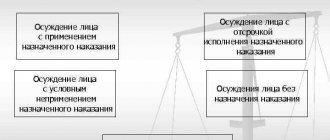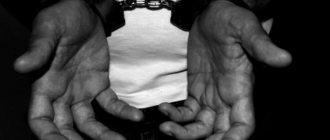Criminal Code of the Russian Federation in the latest edition:
Article 124 of the Criminal Code of the Russian Federation. Failure to provide assistance to a patient
1. Failure to provide assistance to a patient without good reason by a person obligated to provide it in accordance with the law or with a special rule, if this negligently resulted in the infliction of moderate harm to the health of the patient, -
shall be punishable by a fine in the amount of up to forty thousand rubles, or in the amount of the wages or other income of the convicted person for a period of up to three months, or by compulsory labor for a term of up to three hundred and sixty hours, or by corrective labor for a term of up to one year, or by arrest for a term of up to four months.
2. The same act, if it negligently entailed the death of a patient or the infliction of grievous harm to his health, -
shall be punishable by forced labor for a term of up to four years with deprivation of the right to hold certain positions or engage in certain activities for a term of up to three years or without it, or by imprisonment for a term of up to four years with deprivation of the right to hold certain positions or engage in certain activities for a term of up to three years, or without one.
Return to the table of contents of the document: Criminal Code of the Russian Federation in the latest edition
Comments on Article 124 of the Criminal Code of the Russian Federation
Object of crime . The immediate object of the crime is the life and health of the patient who needs medical care.
Victim . The law directly identifies the victim of a crime as the patient. According to the law, a patient in this case should be recognized as any person who objectively needed medical care and:
- specifically applied for its provision;
- underwent a routine examination;
- to whom medical assistance was provided without his consent;
- found himself in a situation requiring urgent medical intervention (for example, a car accident).
Moreover, from a medical point of view, the victim may not actually be sick (for example, pregnant women, women in labor).
The objective side of the crime is characterized by an act in the form of inaction (failure to provide assistance to a patient), a special situation in which the crime was committed (lack of valid reasons for failure to provide assistance), a consequence (causing moderate harm to the health of the patient) and a causal relationship between the socially dangerous act and the consequence.
The crime is considered completed from the moment of causing moderate harm to the health of the patient.
Medical care is a set of measures aimed at maintaining and (or) restoring health and including the provision of medical services. A medical service is defined as a medical intervention or a set of medical interventions aimed at the prevention, diagnosis and treatment of diseases, medical rehabilitation and having an independent, complete meaning. Because of this, refusal to provide other types of assistance (psychological, social, material, etc.), as well as failure to provide illegal assistance (for example, a justified refusal to provide narcotic drugs to a drug addict), even in the presence of socially dangerous consequences, cannot be qualified under Art. . 124 of the Criminal Code of the Russian Federation.
Before medical assistance in case of accidents, injuries, poisoning and other conditions and diseases that threaten their life and health, citizens are provided with first aid by persons obligated to provide it in accordance with federal law or with a special rule and who have appropriate training, including employees of authorities Internal Affairs of the Russian Federation, employees, military personnel and employees of the State Fire Service, rescuers of emergency rescue units and emergency services. Drivers of vehicles and other persons have the right to provide first aid if they have appropriate training and (or) skills. The regulations of the above-mentioned departments also contain the obligation of the relevant persons to provide first aid and take measures to organize medical care.
The concept of “failure to provide assistance to a patient”, therefore, also includes such actions as the refusal of the relevant subjects to call an ambulance, to transport the patient to a medical facility, etc. Other persons must, under certain conditions, be held accountable under Art. 125 of the Criminal Code of the Russian Federation “Leaving in danger.”
The objective side of the crime is expressed in the fact that the perpetrator refuses or evades providing medical care to a patient without good reason , does not perform the necessary actions that he is obliged to perform to treat the patient or save a life, or performs them in bad faith or untimely. For example, he does not provide first aid at the scene of the incident, does not use the medicine that he has and which he should use in specific conditions, does not give the victim the necessary artificial respiration, does not stop the bleeding, refuses to go to the victim’s house when called, does not examine the patient due to the lack of an insurance policy, does not refer a seriously ill patient or refuses to transport him, admit him to a medical institution, does not call the necessary specialist, etc. As a result of a person’s negligent attitude to the performance of official duties, the victim is inflicted with moderate or serious harm to health, or this leads to his death.
If the subject provided assistance to the patient, albeit in an inappropriate manner, liability under Art. 124 of the Criminal Code of the Russian Federation is excluded.
Failure to provide the required assistance to a patient by a medical professional in case of any kind of medical error , for example, in the diagnosis of the victim’s health condition (partial inaction) does not constitute this crime. Medical error, under certain circumstances, can serve as a basis for bringing the perpetrator to justice, depending on the consequences that have occurred under Part 2 of Art. 109, part 2 or part 4 of Art. 118, art. 293 of the Criminal Code of the Russian Federation.
A prerequisite for liability for failure to provide assistance to a patient is the absence of valid reasons for this by the perpetrator, which can be both subjective and objective - the illness of the person obliged to provide assistance, his incompetence in a specific situation, force majeure, extreme necessity, the priority of providing assistance to a more seriously ill patient. , lack of transport, medicine, medical instruments, etc.
References to non-working hours, fatigue, departmental or private (non-state) nature of the medical institution, etc. cannot be considered valid.
To qualify a crime, it is important to establish that the subject did not provide exactly the assistance that he should have provided, taking into account his qualifications in a particular situation. To establish the procedure for providing medical care, one should refer to the regulations of executive authorities.
A mandatory element of the crime in question is causation . To establish a causal relationship between failure to provide assistance and harm to health, it is necessary to take into account the nature of the disease, the patient’s condition and other circumstances (in some cases, a forensic medical examination is necessary to establish them). If the provision of assistance could not objectively prevent the onset of consequences in the form of harm to health, liability under Art. 124 of the Criminal Code of the Russian Federation is excluded.
The subjective side of the crime is characterized by a careless form of guilt in relation to causing moderate harm to health. Moreover, a careless form of guilt in the form of negligence is extremely rare, since medical workers, as a rule, foresee the consequences of failure to provide assistance to a patient.
The subject of the crime is a special one - a person who has reached the age of 16 years, is obliged to provide assistance in accordance with the law, agreement or special rule and has the opportunity to do so. These may be doctors who are entrusted with the duty to provide assistance to the patient, paramedics, nurses, and other persons associated with the performance of the professional functions of a medical worker in providing medical care to the patient, for example, police officers, who are obliged according to the Police Law to take urgent measures to save citizens, provide first aid, leaders of tourist groups and other persons obliged to take measures when calling a medical professional.
Persons who do not have the characteristics of a special subject, if there are grounds, are liable under Art. 125 of the Criminal Code of the Russian Federation.
Composition of the crime and forms of guilt
The legislator points out: in order to become a defendant in a criminal case, a person with a medical education must remain inactive in cases where his help is really needed. In this case, the patient must suffer at least moderate harm to health.
Despite all the seemingly obviousness of the situation, the obligation to provide medical care still needs to be proven. After all, the medical institution employs staff who, due to their duties, simply do not have the right to touch patients.
There are also cases when victims refuse hospitalization, but they are forced and suffer consequences in the form of minor harm to health. However, no one can punish for causing minor harm.
Inadequate provision of medical care may result in the following circumstances::
- the patient is seriously injured after a traffic accident and is not provided with assistance;
- the victim was helped, but not in time and death or serious consequences occurred;
- the doctor did not help and left, leaving the man in serious condition.
Situations vary, but for criminal prosecution it is the consequences that matter.
If we talk about the form of guilt, the paradox is that it is double. This means that the doctor must deliberately refuse help, but he cannot “count” on what specific health problems will occur in the patient. Therefore, the legislator indicates that, in relation to the consequences, the guilt is careless.
Failure to provide assistance to a patient, resulting in the death of the patient or causing serious harm to his health
Part 2 of Article 124 of the Criminal Code of the Russian Federation provides for liability for failure to provide assistance to a patient if this negligently resulted in the death of the patient or the infliction of serious harm to his health.
The subjective side of this crime is also characterized by a careless form of guilt.
From crimes provided for in Part 2 of Art. 109 and part 2 of Art. 118 of the Criminal Code of the Russian Federation, the act in question is distinguished by the characteristics of the subject and the specific characteristics of the objective side, and the relevant norms are correlated as general and special.
If the guilty person does not provide assistance to a patient with the purpose of intentionally causing harm to his health, then, depending on the severity of the consequences, responsibility arises for committing an intentional crime under Art. 105, or 111, or 112 of the Criminal Code of the Russian Federation.
What is the article for failure to provide medical care?
Rules for providing assistance to a patient are issued more like departmental acts intended for official use. At the same time, some doctors do not refuse to take action at all, but are simply lost. After all, they are people too.
In general, there is an opinion that it is quite difficult to punish medical workers, doctors of hospitals and clinics, since all opinions and certificates about the medical history are written by their colleagues. Often they don’t give out theirs.
Some investigators complain that even with all the evidence the victims have, doctors are still trying to “get out.”
Despite all the difficulties in bringing a doctor to criminal liability, failure to provide medical care. assistance to a person obligated to do this is “punishable” by criminal law and the punishment is provided for in Art. 124 of the Criminal Code of the Russian Federation. Although cases are initiated only when a person has already died and mainly due to the negligence of doctors.
Is expertise needed?
The issue of ordering a forensic medical examination is decided by the investigator investigating the case. If necessary, he always instructs specialists to examine all the patient’s medical documents.
In case of death, a forensic medical examination is carried out to determine the cause of death of the victim. They find out whether the doctor’s actions could have influenced the consequences that occurred. The conclusion will be one of the decisive evidence of the suspect’s guilt.
It should be noted that during a commission examination, the guilty doctor cannot participate in the study and write part of the conclusion. It is illegal.
Consequences of death
The death of a patient has a negative impact on the doctor's life in any case. Whether it was his violation of instructions or rules, or the circumstances developed in such a way that the doctor simply did not have time to help.
As already indicated in the article under discussion, the consequences of the death of the patient will lead to a more severe punishment. In this case, the doctor may lose his license to provide medical services or go to prison.
All issues of punishment are decided by the court, based on the evidence provided by the investigation authorities. In such cases, it is rarely possible to “get out”.
Execution of punishment
Everything will depend on what punishment the court imposes. The Criminal Code of the Russian Federation has some rules for their implementation.
For example, compulsory, forced and correctional labor, as well as imprisonment are assigned only as the main form of punishment. But a fine and deprivation of the right to engage in medical activities may be an additional sanction.
As an analysis of judicial practice in cases of this category has shown, courts usually revoke a license to provide medical services and impose imprisonment. According to Part 1 of Art. 124 of the Criminal Code of the Russian Federation there are practically no precedents. Things are “set in motion” only after the death of the victim.









